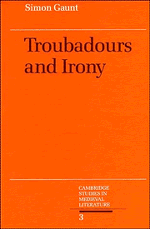Summary
Marcabru's poetry stands apart from that of all other early troubadours. The work of an inspired poet, it is devoted not to the anguished self-examination and laments of the courtly lover, but almost exclusively to satire, moralizing and polemic. Yet his influence both on his contemporaries and on later troubadours is so great that it is difficult to appreciate their work without a knowledge of his poetry: Marcabru occupies a crucial position in the troubadour tradition.
Irony is obviously an ideal weapon for the satirist and there is hardly a single poem where Marcabru is not ironic in some way. I believe an awareness of irony in Marcabru's work will, in many instances, enrich our view of the texts; in some cases it may help to explain hitherto obscure passages. Moreover, an examination of his use of irony may further our understanding of his eloquentia and help us to focus on his position not only as a moralist, but also as an entertainer: despite the ostensibly serious nature of his subject matter, Marcabru can be as playful as many of his contemporaries. I propose to examine first the possible influence of rhetoric on Marcabru's irony, secondly his ironic sexual metaphors, thirdly his use of signals to irony, fourthly his use of parody, and finally irony dependent on intertextuality.
MARCABRU AND THE RHETORIC OF IRONY
Marcabru's knowledge of rhetoric and his attitude to acquired eloquence have already been thoroughly examined by Linda Paterson: he was well versed in rhetorical techniques and his attacks on the abuse of eloquence form an integral part of his moral code.
- Type
- Chapter
- Information
- Troubadours and Irony , pp. 39 - 79Publisher: Cambridge University PressPrint publication year: 1989



